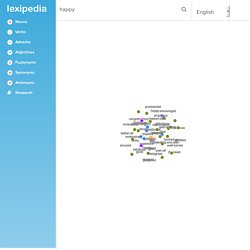

Happy. English is a West Germanic language that was first spoken in early medieval England and is now a global lingua franca.

Named after the Angles, one of the Germanic tribes that migrated to the area of Britain that would later take their name, England, both names ultimately deriving from the Anglia peninsula in the Baltic Sea. It is closely related to the Frisian languages, but its vocabulary has been significantly influenced by other Germanic languages, particularly Norse (a North Germanic language), as well as by Latin and French.[6] English has developed over the course of more than 1,400 years. The earliest forms of English, a set of Anglo-Frisian dialects brought to Great Britain by Anglo-Saxon settlers in the 5th century, are called Old English. Middle English began in the late 11th century with the Norman conquest of England and was a period in which the language was influenced by French.
Memonic - The Collaborative Online Notebook. 20 Must-Have Educational Resources For All Teachers. Edudemic often features posts providing a list of top resources for a particular category. Recently, the site gettingsmart.com posted the names of the LAUNCHedu finalists chosen by the SXSWedu® Conference, offering even more resources for the Edudemic staff to consider! On March 7, 2012, they will choose winners after a full day of presentations by the finalists. There are so many sites and programs on the Internet already, but this competition just goes to show that the need for educational resources is still great.
Necessity is the mother of invention, they say. The cliche works because it is true. Free eCards, Online Greetings for Birthday, Holiday, and More. Listen and Write - Dictation. Little Bird Tales - Home.
Advientos - Online Advent Calendar. What is Microtraining? Microtraining is a smart way of conveying information between people in only 15 minutes. It is a time-saving method for sharing knowledge and using the expertise of everyone in the organization. Microtraining does not replace formal learning but works as an updater and knowledge enhancer.